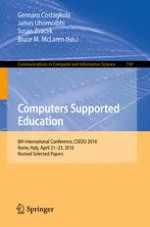2017 | Book
Computers Supported Education
8th International Conference, CSEDU 2016, Rome, Italy, April 21-23, 2016, Revised Selected Papers
Editors: Gennaro Costagliola, Prof. Dr. James Uhomoibhi, Susan Zvacek, Bruce M. McLaren
Publisher: Springer International Publishing
Book Series : Communications in Computer and Information Science
